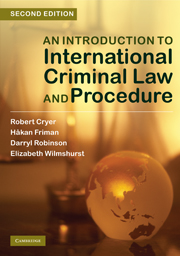Book contents
- Frontmatter
- Contents
- Preface to the Second Edition
- Table of Cases
- Table of Treaties and other International Instruments
- Table of Abbreviations
- PART A INTRODUCTION
- PART B PROSECUTIONS IN NATIONAL COURTS
- 3 Jurisdiction
- 4 National Prosecutions of International Crimes
- 5 State Cooperation with Respect to National Proceedings
- PART C INTERNATIONAL PROSECUTIONS
- PART D SUBSTANTIVE LAW OF INTERNATIONAL CRIMES
- PART E PRINCIPLES AND PROCEDURES OF INTERNATIONAL PROSECUTIONS
- PART F RELATIONSHIP BETWEEN NATIONAL AND INTERNATIONAL SYSTEMS
- Index
- References
5 - State Cooperation with Respect to National Proceedings
from PART B - PROSECUTIONS IN NATIONAL COURTS
Published online by Cambridge University Press: 05 June 2012
- Frontmatter
- Contents
- Preface to the Second Edition
- Table of Cases
- Table of Treaties and other International Instruments
- Table of Abbreviations
- PART A INTRODUCTION
- PART B PROSECUTIONS IN NATIONAL COURTS
- 3 Jurisdiction
- 4 National Prosecutions of International Crimes
- 5 State Cooperation with Respect to National Proceedings
- PART C INTERNATIONAL PROSECUTIONS
- PART D SUBSTANTIVE LAW OF INTERNATIONAL CRIMES
- PART E PRINCIPLES AND PROCEDURES OF INTERNATIONAL PROSECUTIONS
- PART F RELATIONSHIP BETWEEN NATIONAL AND INTERNATIONAL SYSTEMS
- Index
- References
Summary
Introduction
Criminal law and proceedings are at the heart of state sovereignty and cooperation in criminal matters is a voluntary undertaking; a State is not obliged to cooperate with others in criminal matters unless it has agreed to do so. But over time, the parochial view that criminal law, including its effects, is local in nature has given way to an ever-growing need for and actual regulation of international legal cooperation. Influential factors in this regard are increased cross-border activities, including the commission of crimes, international terrorism and the development of human rights.
International crimes are of concern to all States and therefore lend themselves to efforts at cooperation. A commitment to cooperate, in the form of extradition, is the alternative to prosecution in accordance with the aut dedere, aut judicare principle, when applicable. Cooperation is particularly important when the State is exercising jurisdiction over crimes committed abroad, but may also be necessary when a State is investigating and prosecuting crimes committed on its own territory. Prosecution of genocide, crimes against humanity and war crimes is no exception.
But international law, treaty and custom has not (yet) developed a special regime for State-to-State cooperation concerning these crimes. The Geneva Conventions and Additional Protocol I, for example, explicitly refer to cooperation in accordance with domestic legislation. One must therefore resort to general principles and provisions of international and domestic law on international cooperation in criminal matters.
- Type
- Chapter
- Information
- An Introduction to International Criminal Law and Procedure , pp. 85 - 106Publisher: Cambridge University PressPrint publication year: 2010



